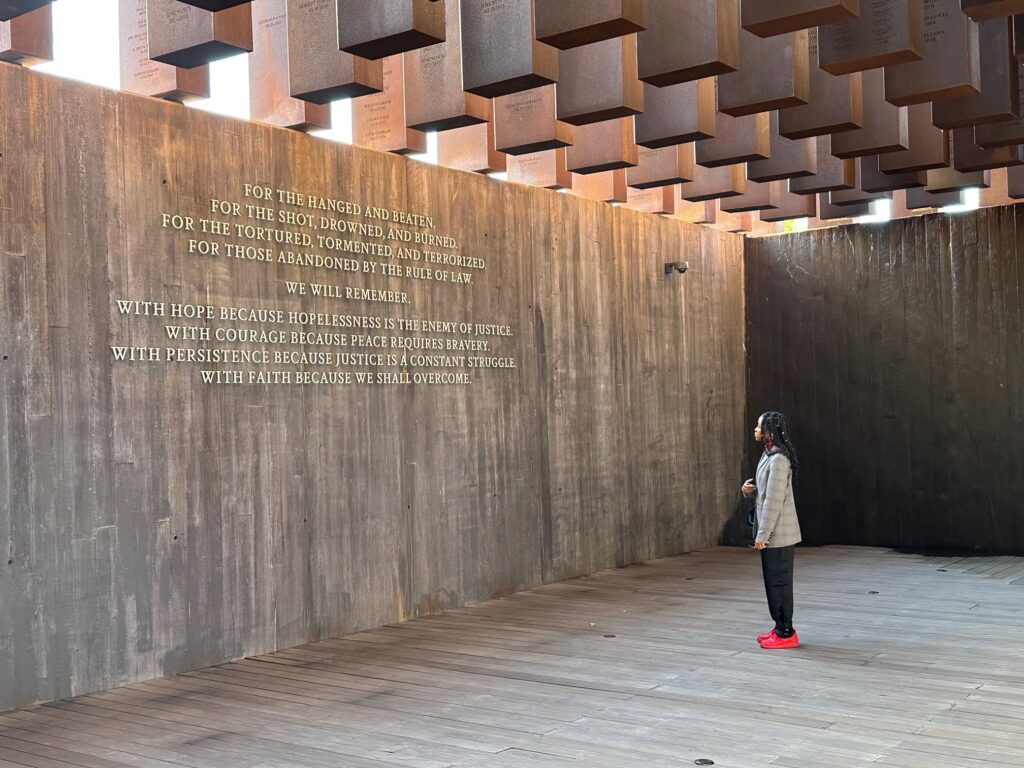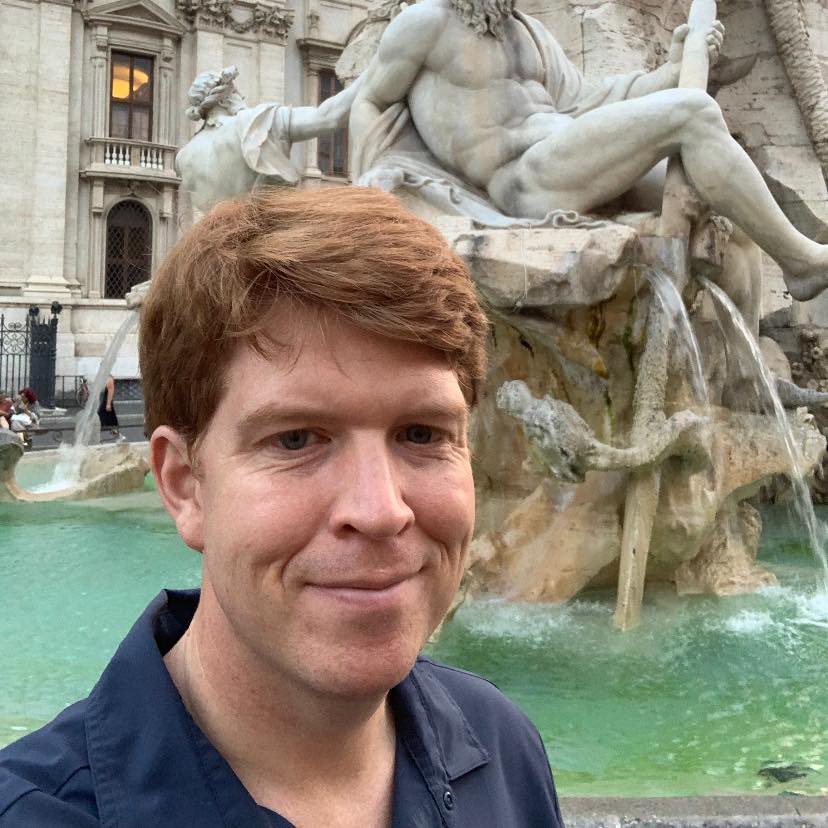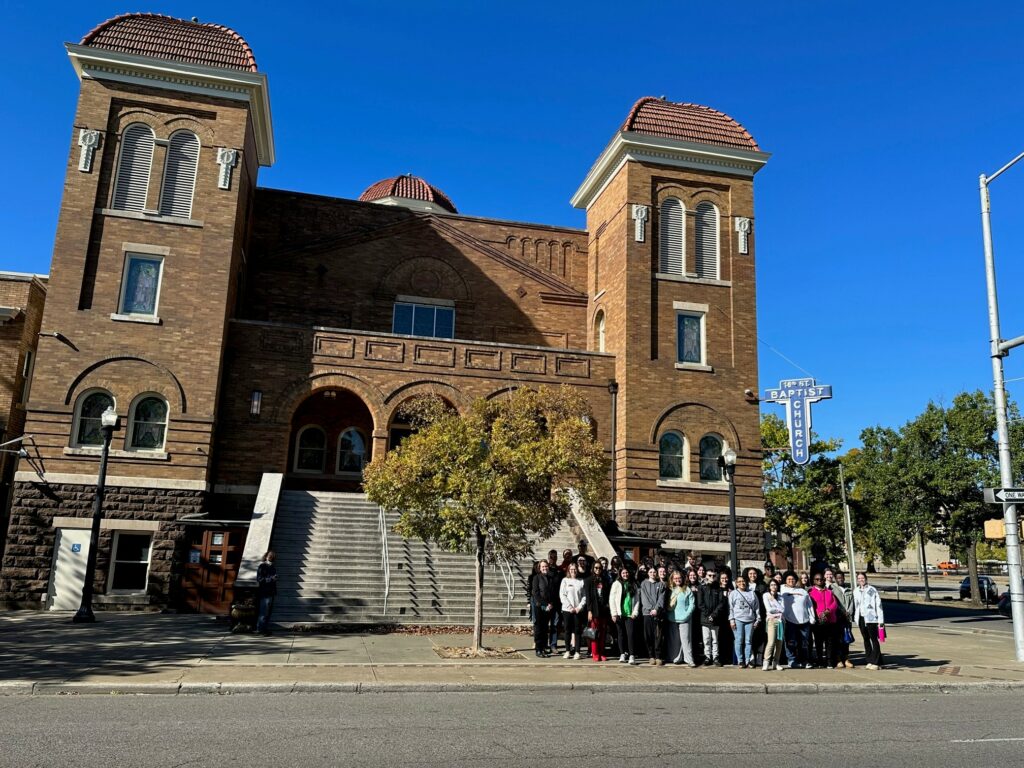
Many colleges and universities use retreats to facilitate vocational exploration among students. The opportunity to leave campus, remove oneself from distractions, and embark on meaningful exploration is valuable. But while some retreats are designed to cut through the harsh realities of our world in order to focus on the interior, this is a story about vocational experiences designed to facilitate direct encounters with the exterior world and its hardest truths of injustice.
For the past several years, Georgetown College has taken a group of about 40 students for a three-day trip away from their campus near Lexington, KY, to the Equal Justice Initiative (EJI) in Montgomery, AL. Founded by acclaimed lawyer and celebrated author Bryan Stevenson, this dynamic site includes the Legacy Museum and the National Memorial for Peace and Justice. The visiting Georgetown students have the opportunity to witness marginalization tied to poverty and racial discrimination. Rather than a retreat away from the world, this trip facilitates an encounter with the hardest truths of our external world—and, in so doing, reshapes participants on the inside as well.

Importantly, the trip is tied to a required first-year course at Georgetown called “Foundations 111: Being Human.” The director of Foundations 111, John Henkel, who is also a professor of classics and general studies and chair of the World Languages Department, believes the challenging experiences at EJI foster deep questions. Confronting the histories of slavery, lynching, Jim Crow, and mass incarceration is “emotionally moving” and has helped draw powerful connections between the question of what it is to be human and the commitment to justice. In his reflections on the EJI pedagogy, Henkel explains that “Stevenson wants to bring you along on the journey, and he’s hopeful about how he talks about race relations in America. It’s hard to emulate hope without leaders who model this.” As students encounter tangible evidence, artifacts, art, and the memorial dedicated to how systemic white supremacy has been deployed in this country, they are also being shown a model of hope. Stevenson “has a narrative around race in America that is very bracing and gives you pause. It is a truth-telling campaign,” Henkel says. This is a truth and reconciliation project “rooted to the fact that we can’t move forward unless we’re honest about ourselves and our past.”
This experience is a teaching experience. A confrontational experience. And it is a vocational experience. Henkel shares with students that his family was originally from Alabama and moved to Virginia during the Civil Rights era of the 1960s. “I try and talk about the themes as universal issues, but I’m very clear that I’ve got skin in the game, and probably most of them do too,” he says. As they receive the content from EJI and are guided by faculty members exploring their own stories, students on this trip are given a shared personal experience that fosters deep conversations with one another. At one point, the entire Georgetown group engages in a discussion of personal experiences while in the space, which can lead to animated dialogues and reflection on the human condition, societal commitments to justice, and personal career paths. Though the trip changes each year, Henkel is committed to it because “the material does affect students both in their identity and their trajectory.”

NetVUE awarded Georgetown College a Professional Development Grant that allowed them, for the first time, to provide this trip only for faculty members who teach in the Foundations 111 course. The goal was not only to convince faculty members of the excursion’s obvious benefits but also to invite new ways of infusing justice into the curriculum. The result has been twofold. First, the trip has thrived, requiring a charter bus instead of vans, gathering more institutional commitments, and experiencing a flourishing of community partnerships with local churches and religious organizations. Second, the trip has allowed more folks on campus to reflect on the institutional vocation of Georgetown College. As a Christian school with a Baptist history that severed its ties to the Kentucky Baptist Convention over 20 years ago, the college asked the question: what does it mean to be a Christian institution of higher education in this time and place? The Equal Justice Initiative—and the encounters with history and identity it fosters—has allowed them to have a shared experience around education, justice, and the Christian identity of the institution.
What can other schools take from this? Three observations. For an institution, a shared encounter with challenging history can be a powerful tool for conversations about meaning and purpose. For a student, having peers who have encountered the same emotionally powerful experience of racial justice allows a kind of conversation unlike others—about the meaning of being human, their role in justice advocacy, and their life’s purpose. For a professor, this trip opens new conversations aligned to one’s own vocation. As Henkel puts it, “These trips help me find a way to incorporate issues about justice and personal vocation that I would have more trouble doing because I’m a Latin professor. This is really valuable to me as a way to teach about my own personal moral commitments.”
Learn more about the Equal Justice Initiative Learn more about Georgetown College

